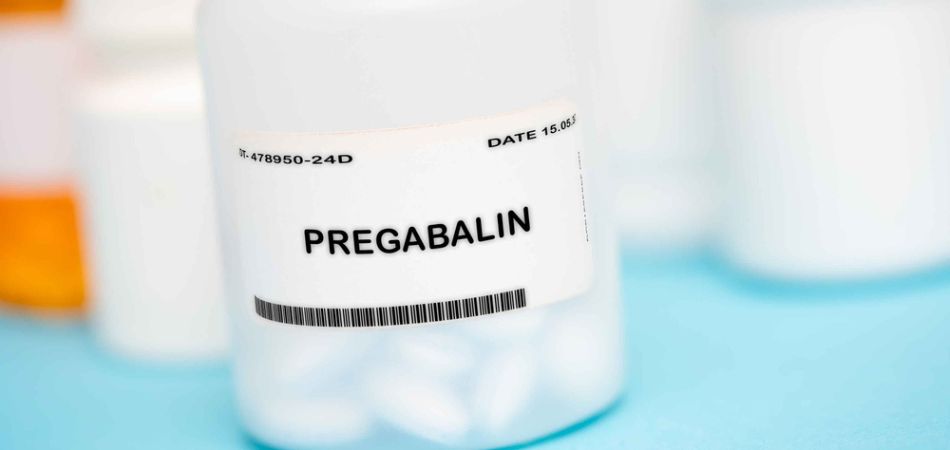
Written by:

Medically Reviewed by:
Last Updated:
October 29th, 2025
From 2019 onwards, the UK government reclassified pregabalin as a “class-C controlled drug” to curb misuse and its increasing link with drug-related deaths. Yet research from the Pharmaceutical Journal shows that prescriptions of pregabalin have increased almost 25% since then.
While its use increases, public understanding of the ways pregabalin interacts with other substances remains at a dangerous standstill.

What is pregabalin and why is it prescribed?
Pregabalin is a prescription medication used to treat several neurological and psychiatric conditions. It’s most commonly prescribed for generalised anxiety disorder (GAD), nerve pain, epilepsy, and fibromyalgia. Known by the brand name Lyrica, pregabalin works by calming overactive nerves in the brain and spinal cord.
Similarly to gabapentinoids, pregabalin doesn’t act like traditional painkillers such as opioids or NSAIDs. Instead, it alters the way nerves transmit signals, alleviating some symptoms like seizures, anxiety and chronic pain within an hour. Medical professionals prescribe it for conditions involving nerve sensitivity or heightened excitability in the nervous system.
When taken correctly, pregabalin is incredibly useful for improving a person’s quality of life. Yet, its calming and euphoric effects also mean it carries a high risk of misuse, with its dangers being amplified when other substances like alcohol are put into the mix.
Why do people mix pregabalin and alcohol?
The reasons that a person may consume alcohol while pregabalin is in the system vary. Some of the most common reasons may include:
- Underestimating or misunderstanding cross-use: Pregabalin is shown to stay in your blood (plasma) for up to 35 hours, and can remain detectable in urine for up to 6 days. It is believed to have a half-life of around 6 hours. Drinking alcohol while pregabalin is in your system may incrementally increase the effects of each substance.
- Recreational misuse and self-medication: Some people misuse pregabalin for its calming and sedative effects, especially for those struggling with anxiety or insomnia. Alcohol, too, is of course used by some to self-medicate uncomfortable feelings. When used in conjunction, the goal may be to numb oneself from difficult feelings, but the combination may backfire in a myriad of ways.
- The illusion of amplified relaxation: Some people will describe the combination of the substances as a deeper relaxation. Yet this “floaty” feeling masks what’s really going on, as the body is being overwhelmed by two substances that can severely slow your heart rate and the way your brain is functioning.
The dangers of combining pregabalin with alcohol
Mixing pregabalin and alcohol may be more dangerous than many people first realise. The risks when the two combine are significant, especially as tolerance builds. Here are the main risks found in the combination:
Pregabalin and alcohol addiction
Most addictions don’t form with extreme or reckless use. For most, addictions form silently, like movement under water that appears calm on the surface. Pregabalin might be taken for pain relief, then alcohol used for stress relief. As a person’s tolerance increases and the effects wear off more quickly, the desire for more can work its way into their subconscious behaviours.
Both substances have significant addiction potential. Their combined effects will also make withdrawal symptoms more severe, so you may notice some of the following:
- You need higher doses of pregabalin or alcohol to feel relaxed.
- You feel anxious, shaky, or unwell when you don’t use either substance.
- You start hiding your usage or downplaying it to others.
- Responsibilities, relationships, or health are suffering, yet the cycle continues.
Addiction to either substance will forge a grip that becomes increasingly difficult to escape alone. When both addictions are at play, treatment may become a matter of life or death.
Yet recovery is still possible, with the right support.
How to stop mixing pregabalin and alcohol safely
If you’ve been using pregabalin and alcohol together, stopping suddenly can be dangerous. Withdrawal symptoms from either substance can range from uncomfortable to life-threatening. That’s why careful planning and professional support are crucial:
- Understand the dangers of sudden withdrawal: Quitting “cold turkey” from pregabalin or alcohol can cause severe physical and psychological symptoms, including seizures, panic attacks, confusion, and even hallucinations. Take time to fully comprehend the risks involved with quitting both substances.
- The importance of medical detox: Detoxing with the support of trained professionals will allow your body to adjust to life without pregabalin and alcohol in a more supported environment. People with experience can help alleviate your symptoms and manage complications before they potentially escalate.
- Therapy and support for long-term healing: Lastly, it will benefit you to think of addictions in a holistic sense. Yes, there are immediate cravings and urges to return to using the substances, but therapists can help you come to terms with the true, deep drivers of addictive behaviours. Courses of therapy will help you reframe behaviours that instigate urges in the first place, giving you more room for long-term healing and recovery.
Where can I find help to escape my addiction?
If you’re caught in the cycle of mixing pregabalin and alcohol, you might feel overwhelmed or unsure where to turn. But you don’t have to figure it out on your own. Reaching out for help could be the step that changes your life for the better, forever.
At Sanctuary Lodge, we specialise in supporting people facing complex addictions like polydrug use. You may be on the edge of pregabalin misuse or feel yourself losing control of your drinking. Our team understands the complexities of addiction and is ready to help you stop.
Take back your life before the damage deepens and the driving force of consumption becomes overwhelming. Call Sanctuary Lodge today and begin your journey to a brighter future, free from substance addiction.




